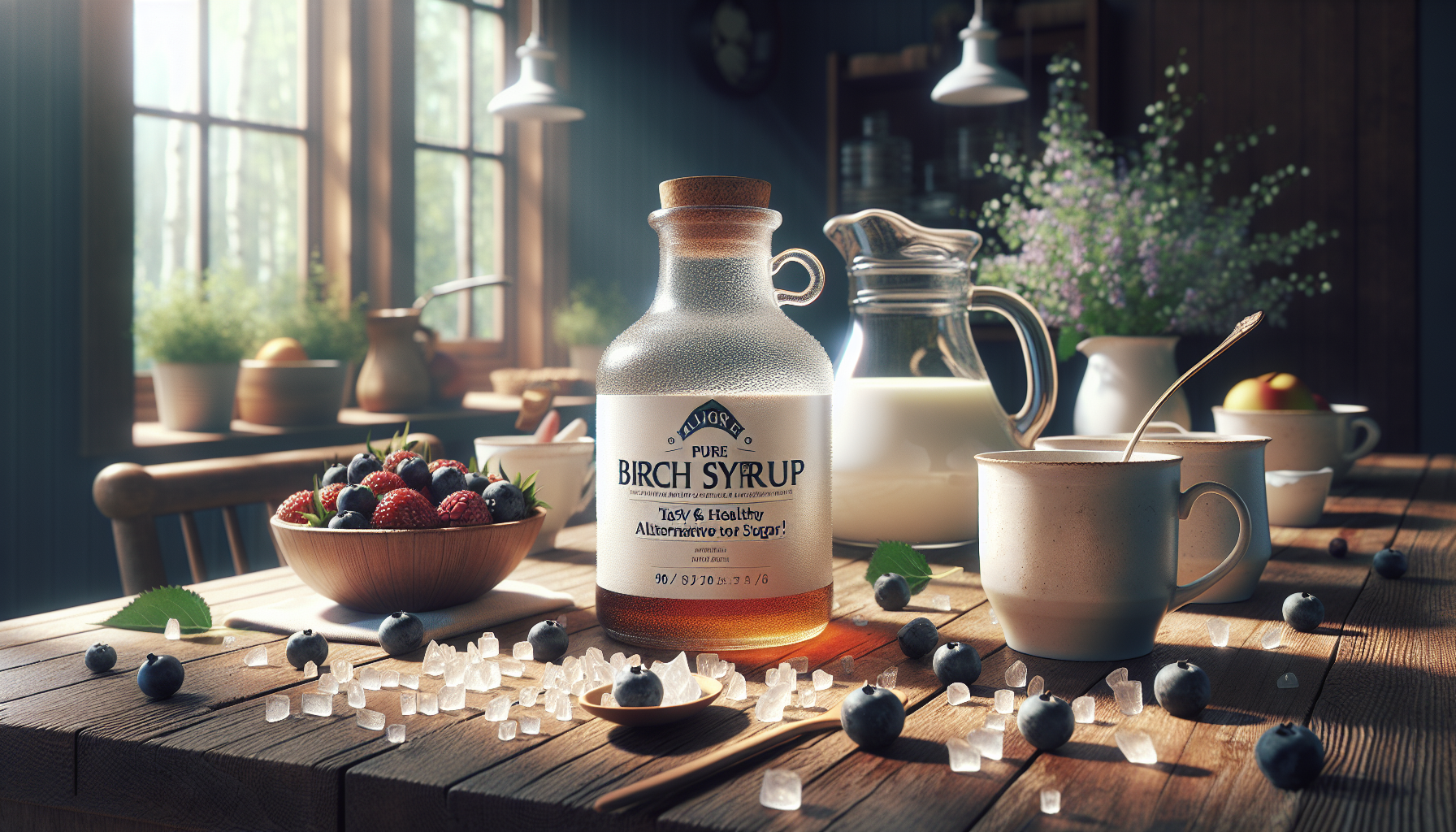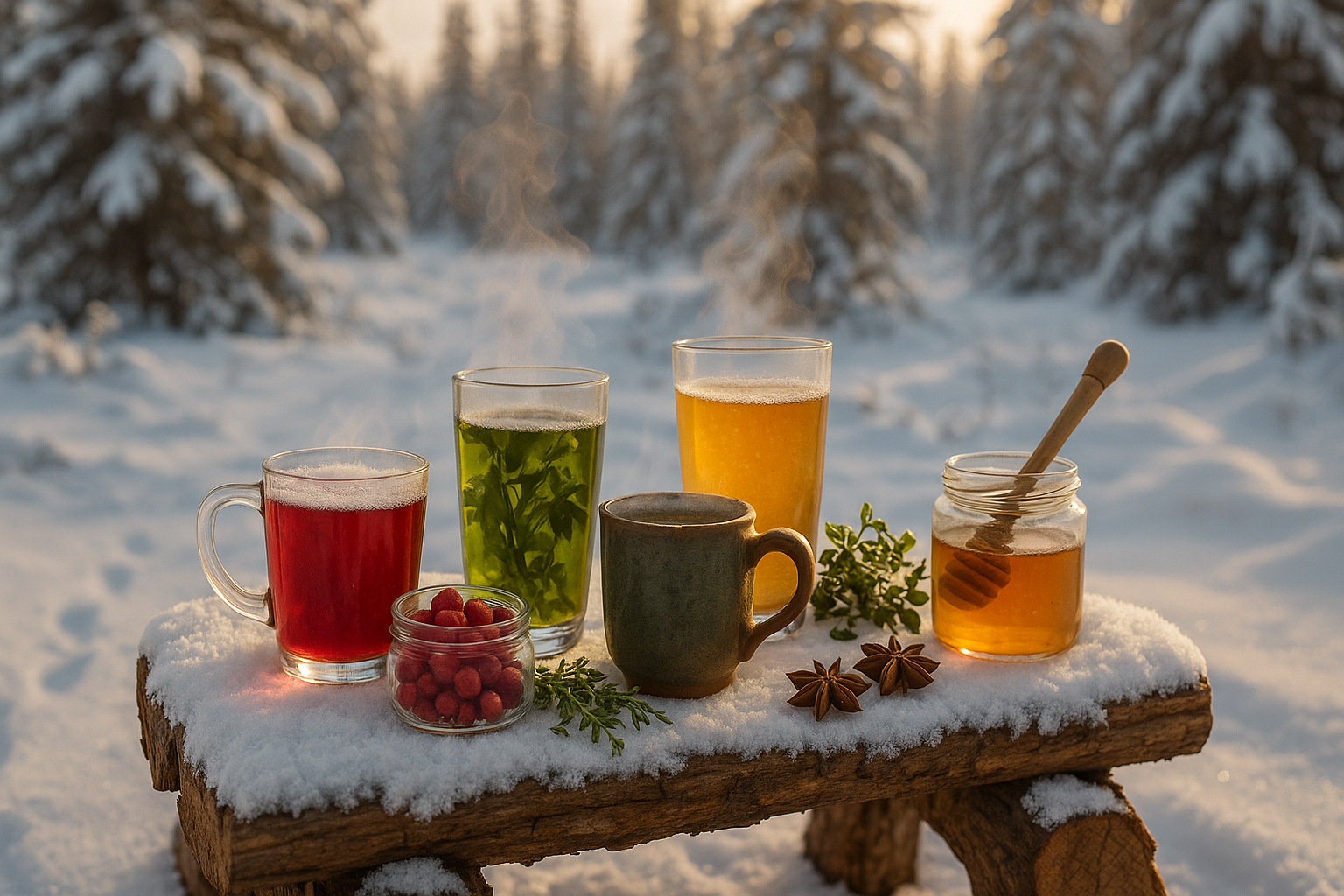In a world where health consciousness is rapidly gaining momentum, the quest for natural and nutritious alternatives to refined sugar has never been more urgent. Amidst the myriad of sweeteners available, one stands out not only for its unique taste but also for its plethora of health benefits: birch sap. Often overshadowed by its more popular cousin, maple syrup, birch sap is a hidden gem waiting to be discovered by those eager to sweeten their lives naturally. 🌿 This fascinating elixir, tapped from the majestic birch trees, offers a delightful sweetness that is subtly different from conventional sugars, making it an ideal choice for health enthusiasts and culinary adventurers alike.
Imagine a sweetener that not only tantalizes your taste buds but also nourishes your body. Birch sap is precisely that—an all-natural beverage that is both a culinary delight and a nutritional powerhouse. Its slightly sweet, crisp taste is a testament to the purity of the forest from which it is harvested. Rich in essential vitamins and minerals, birch sap serves as a refreshing alternative to sugary drinks and artificial sweeteners. By incorporating birch sap into your diet, you’re not just opting for a healthier lifestyle, but also embracing a sustainable and eco-friendly practice. 🌱
This article delves deep into the enchanting world of birch sap, exploring its origin, benefits, and how it compares to other sweeteners. We will uncover the historical significance of birch sap, tracing its roots back to traditional practices in Northern Europe and Asia, where it has been cherished for centuries. From there, we will explore the remarkable health benefits that birch sap offers, including its potential to boost immunity, aid digestion, and promote overall well-being. As we journey through the nutritional landscape of birch sap, you’ll discover how its unique properties can be harnessed in everyday recipes, transforming ordinary meals into extraordinary culinary experiences.
Moreover, this article will guide you on where to find and how to incorporate birch sap into your daily routine. Whether you’re looking to sweeten your morning coffee, add a new dimension to your smoothies, or experiment with gourmet recipes, birch sap offers endless possibilities. We will also discuss the environmental impact of birch sap harvesting, shedding light on sustainable practices that ensure the preservation of this precious resource for future generations. So, get ready to embark on a journey of discovery, where the simple act of choosing a natural sweetener like birch sap can lead to a healthier, more balanced lifestyle. 🍃
The Rise of Natural Sweeteners
In recent years, there has been a significant shift towards natural and healthier alternatives to sugar. As people become more conscious of their dietary choices and the health implications of refined sugar, the demand for natural sweeteners has surged. Among these alternatives, birch sap stands out as a unique and nutritious option. 🌿 This clear, slightly sweet liquid extracted from birch trees has been consumed for centuries, particularly in Northern Europe and parts of Asia, but is only now gaining recognition globally.
Birch sap, often referred to as “birch water,” is harvested during early spring when the sap flows naturally from the trees. It is rich in essential nutrients, including vitamins, minerals, and antioxidants, making it a wholesome choice for those looking to reduce their sugar intake. Unlike refined sugar, which offers empty calories, birch sap provides nutritional benefits that contribute to overall health and well-being. Its naturally sweet taste and low-calorie content make it an appealing substitute for sugar in various recipes and beverages.
The process of harvesting birch sap is sustainable and environmentally friendly. The trees are tapped in a manner that does not harm them, allowing for annual collection without adverse effects on the ecosystem. This aspect of birch sap production aligns with the growing consumer interest in sustainable and ethical food sources. As more people seek alternatives to sugar that are both healthy and environmentally responsible, birch sap presents itself as a compelling choice.
Comparing Birch Sap to Traditional Sweeteners
When considering a switch from traditional sweeteners to birch sap, it’s essential to understand how it compares nutritionally and functionally. Refined sugar, honey, maple syrup, and agave nectar are among the most common sweeteners used today. Each has its own nutritional profile and impact on health, as shown in the table below.
| Sweetener | Calories per 100g | Sugar Content | Key Nutrients |
|---|---|---|---|
| Refined Sugar | 387 | 100g | None |
| Honey | 304 | 82.12g | Vitamins B6, C, minerals |
| Maple Syrup | 260 | 59.53g | Calcium, potassium, iron |
| Agave Nectar | 310 | 76g | Calcium, potassium |
| Birch Sap | 5 | 0.1g | Vitamins, minerals, antioxidants |
As you can see from the table, birch sap is incredibly low in calories and sugar compared to other sweeteners. This makes it an excellent choice for those looking to manage their weight or reduce sugar consumption without sacrificing flavor. Additionally, the vitamins and minerals present in birch sap support a range of health benefits, from improved immune function to enhanced hydration.
The Health Benefits of Birch Sap
Birch sap is not just a tasty alternative to sugar; it’s a powerhouse of nutrients that can offer various health benefits. One of the most notable features of birch sap is its rich antioxidant content. Antioxidants are crucial for fighting free radicals in the body, which can cause cellular damage and lead to chronic diseases. Regular consumption of birch sap can help bolster the body’s defense against oxidative stress, contributing to better overall health.
Moreover, birch sap is an excellent source of minerals like potassium, calcium, and magnesium. These minerals play vital roles in maintaining cardiovascular health, supporting bone density, and regulating muscle function. The natural electrolytes in birch sap make it an effective hydrating beverage, especially after physical activities. By replenishing essential nutrients and maintaining hydration, birch sap can aid in recovery and enhance athletic performance.
For individuals managing diabetes or looking to control their blood sugar levels, birch sap offers a low glycemic index, meaning it has a minimal impact on blood glucose levels. This makes it a suitable option for those needing to monitor their sugar intake closely. Including birch sap in your diet can help balance energy levels without the spikes associated with refined sugars.
Integrating Birch Sap into Your Diet
Incorporating birch sap into your daily routine is simple and versatile. It can be consumed as a refreshing beverage on its own or used as an ingredient in various recipes. Here are some ideas to get you started:
- Add birch sap to smoothies for an extra nutritional boost.
- Use birch sap as a base for herbal teas or infused waters.
- Replace sugar with birch sap in baking recipes for a healthier twist.
- Mix birch sap with natural flavorings for a unique homemade soda.
Experimenting with birch sap in your cooking and drinks can open up new flavor profiles while supporting your health goals. Its subtle sweetness and nutritional benefits make it a versatile ingredient in both sweet and savory dishes.
The Environmental Impact of Birch Sap Harvesting
One of the appealing aspects of birch sap is its environmentally friendly production process. Tapping birch trees for sap is a sustainable practice that has been employed for centuries. The process involves drilling a small hole into the tree’s bark, inserting a tap, and allowing the sap to flow into a collection container. Importantly, this method does not harm the tree or impede its growth.
Birch trees are abundant in regions with cold climates, such as Northern Europe and Canada. These areas have a long tradition of harvesting birch sap, which is ingrained in their cultural heritage. The practice of tapping birch trees is carefully managed to ensure that it is sustainable and that the trees are not overexploited. By supporting products made from birch sap, consumers can contribute to the preservation of these traditional methods and the protection of natural resources.
The demand for sustainable and ethically sourced products is on the rise, and birch sap aligns with these consumer values. Choosing birch sap not only promotes health but also supports environmental conservation efforts. By making mindful choices about the products we consume, we can have a positive impact on the planet and the communities that produce these goods.
Exploring the Global Market for Birch Sap
As the popularity of birch sap continues to grow, it is becoming more widely available in global markets. Companies are beginning to recognize the potential of birch sap as a health-oriented product and are investing in its production and distribution. This trend is reflected in the increasing number of birch sap beverages and products on store shelves.
For those interested in trying birch sap, it is essential to choose high-quality products from reputable sources. Look for labels that indicate sustainable harvesting practices and certifications that ensure the product’s authenticity and purity. By supporting brands that prioritize sustainability, you can enjoy the benefits of birch sap while contributing to positive environmental practices.
To learn more about birch sap and its benefits, check out this informative video: Birch Sap: The Natural Elixir of Life (YouTube).
Overall, birch sap presents a promising alternative to traditional sweeteners, offering both health benefits and a sustainable production process. By incorporating birch sap into your diet, you can enjoy its natural sweetness while supporting a healthier lifestyle and a healthier planet. 🌍

Conclusion
Crafting a thoughtful conclusion for the topic “Sweeten Your Life Naturally with Birch Sap: A Tasty and Healthy Alternative to Sugar!” is both an opportunity to emphasize the insights shared throughout the article and to inspire action. Let’s revisit the key points explored and reiterate why birch sap stands out as an exceptional choice for those seeking healthier sweetening alternatives.
Firstly, we delved into the composition and natural benefits of birch sap. Unlike traditional refined sugars, birch sap is harvested directly from birch trees, providing a more sustainable and less processed option. It’s rich in essential minerals like potassium, magnesium, and calcium, which are often stripped away in the refining process of conventional sugars. This natural elixir is not only a sweetener but also a nourishing addition to your diet, supporting overall health and wellness.
The health implications of excessive sugar consumption are well-documented, with links to various chronic conditions such as obesity, diabetes, and heart disease. In contrast, birch sap offers a lower glycemic index, which means it has a reduced impact on blood sugar levels, making it a suitable choice for those managing diabetes or seeking to prevent insulin resistance. This positions birch sap as an attractive alternative for health-conscious individuals who still crave a touch of sweetness in their meals.
In exploring the versatility of birch sap, we highlighted its applications beyond just a sugar substitute. Birch sap can be enjoyed in its pure form, offering a refreshing and hydrating beverage, or used in culinary creations to enhance flavor profiles. From salad dressings to baked goods, birch sap introduces a unique taste dimension that enhances rather than overpowers other ingredients. This adaptability makes it a valuable ingredient in both traditional and contemporary cuisines.
Environmental sustainability was another critical aspect addressed. Harvesting birch sap is a practice that, when done responsibly, supports sustainable forestry management. It involves tapping into birch trees without causing long-term harm, allowing these trees to continue thriving and contributing to their ecosystems. By choosing birch sap, consumers are supporting a product that aligns with environmental stewardship principles, making it a conscientious choice in an era where sustainability is paramount.
In reinforcing the importance of embracing birch sap as a sugar alternative, it’s vital to consider the broader impact on public health and environmental sustainability. As consumers become more educated about their dietary choices, the demand for natural, unprocessed ingredients is likely to increase. Birch sap, with its array of health benefits and minimal environmental footprint, stands poised to play a significant role in this dietary shift.
Ultimately, the choice to incorporate birch sap into one’s lifestyle is a step toward mindful consumption—one that prioritizes health, environmental sustainability, and culinary innovation. We encourage you, dear reader, to explore birch sap in your own kitchen. Try it as a natural sweetener in your favorite recipes, savor its refreshing taste as a beverage, and share your experiences with others.
Engagement is key to spreading awareness and fostering a community of informed consumers. Feel free to leave a comment sharing your thoughts or experiences with birch sap. If you found this article insightful, consider sharing it with friends and family who might also be interested in natural sweeteners. Your participation helps create a ripple effect, encouraging more people to make healthier and more sustainable dietary choices.
In conclusion, birch sap is more than just a sweetening agent; it represents a holistic approach to wellness and environmental responsibility. By embracing birch sap, we are not only enhancing our personal health but also contributing to a healthier planet. Let’s make the choice to sweeten our lives naturally, one drop of birch sap at a time.
For further reading and exploration, here are some active sources where you can learn more about the benefits and uses of birch sap:
1. National Center for Biotechnology Information – Birch Sap
2. Birch Sap Benefits – Healthline
3. Sustainability Practices in Birch Sap Harvesting – Environmental Journal
Together, let’s embrace nature’s gifts and pave the way for a healthier, sweeter future. 🌿





